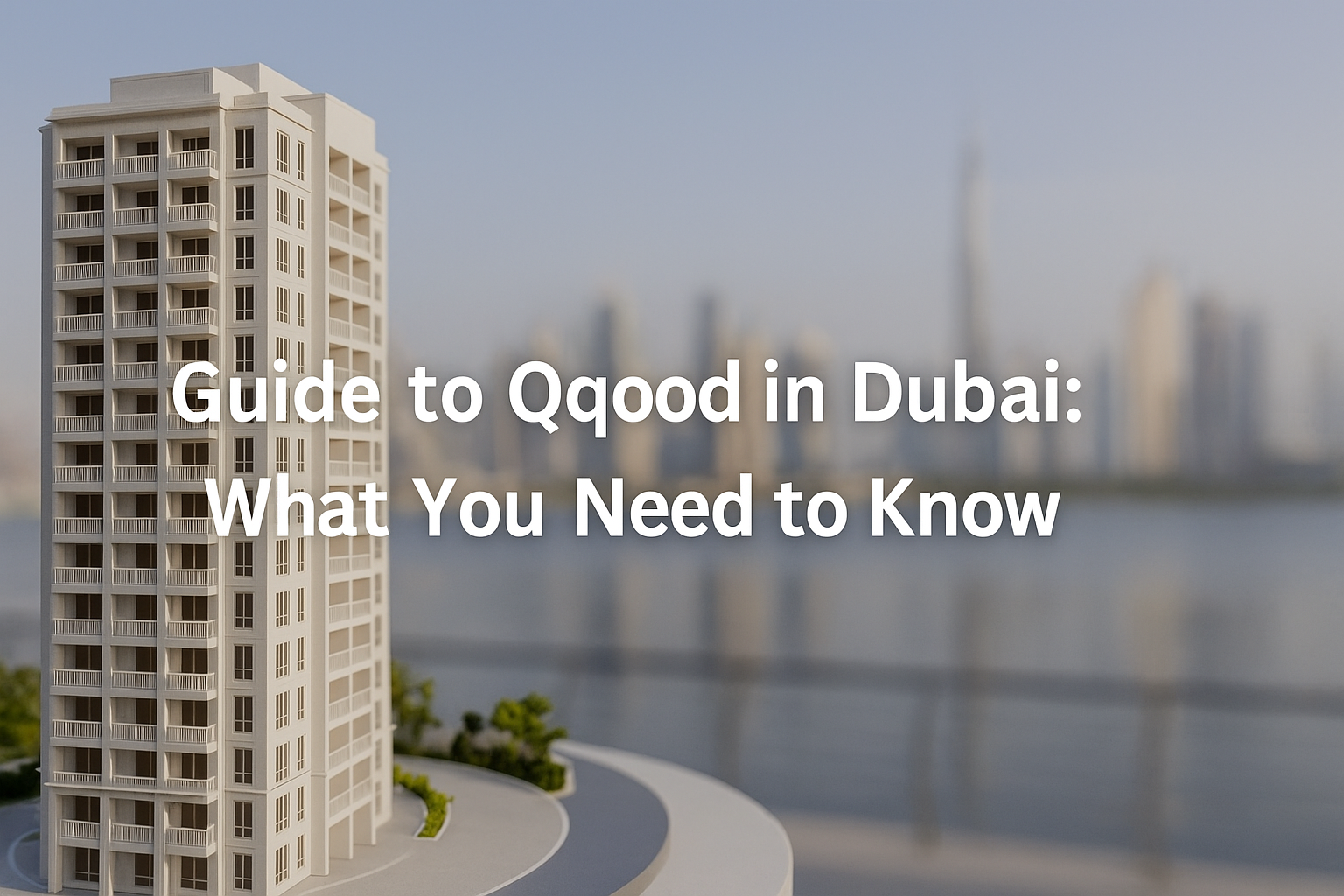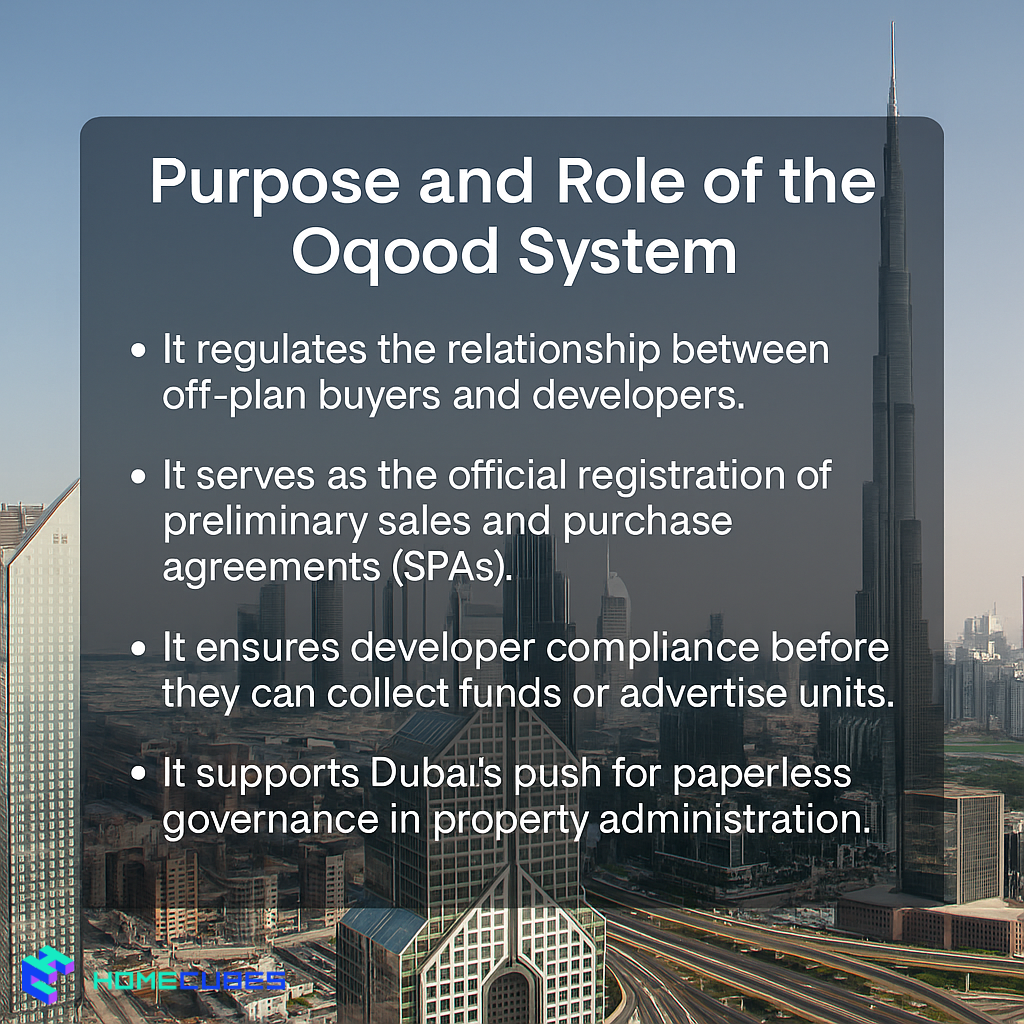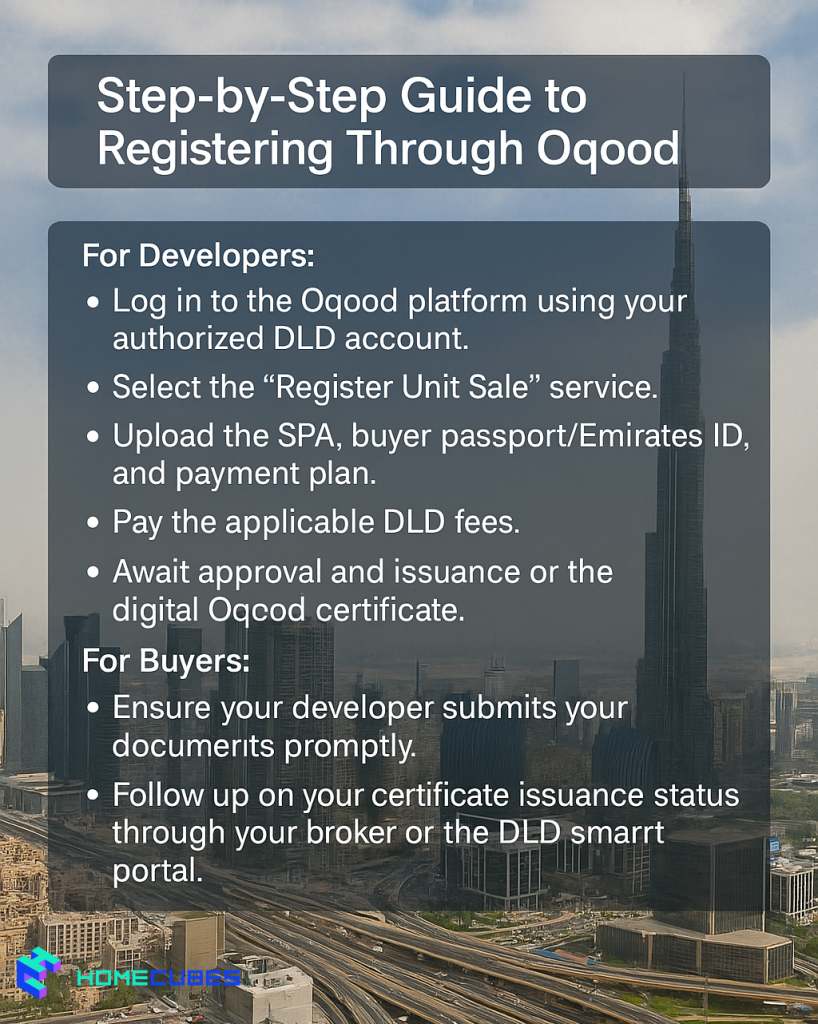

Table of Contents
- Introduction: What Is Oqood Dubai?
- Purpose and Role of the Oqood System
- How Oqood Supports Off-Plan Property Transactions
- Step-by-Step Guide to Registering Through Oqood
- Benefits of Using Oqood in Dubai Real Estate
- Developers’ Obligations Under the Oqood System
- Investor Protections and Legal Implications
- Integration With Other DLD Platforms
- Common Issues and How to Resolve Them
- Fees and Charges Associated With Oqood
- Frequently Asked Questions (FAQs)
- Need Help Navigating Off-Plan Transactions in Dubai?
Introduction: What Is Oqood Dubai?
Oqood (Arabic for “contracts”) is a digital system established by the Dubai Land Department (DLD) and is operated by Emirates Real Estate Solutions (ERES) to register off-plan property contracts in Dubai. The Oqood platform ensures that developers and buyers comply with legal regulations when buying and selling properties under construction.
Dubai property transactions grew by 23% YoY in Q1 2025, with off-plan sales accounting for 69% of deals.
The Al Khail corridor saw significant activity, with strong demand across key @DAMACOfficial projects such as DAMAC Hills 2 and DAMAC Lagoons.https://t.co/muISRRbilR pic.twitter.com/eo1gG8l7TZ
— Ali Sajwani (@Ali_H_Sajwani) June 19, 2025
In short, Oqood Dubai is the official record-keeping system for real estate sales prior to the issuance of a final title deed, providing legal recognition and transparency to off-plan investments.
Purpose and Role of the Oqood System

Launched to support Regulation No. 13 of 2008, Oqood plays a critical role in the real estate ecosystem:
- It regulates the relationship between off-plan buyers and developers.
- It serves as the official registration of preliminary sales and purchase agreements (SPAs).
- It ensures developer compliance before they can collect funds or advertise units.
- It supports Dubai’s push for paperless governance in property administration.
All developers must use Oqood to register sales within 30 days of signing a sale agreement.
How Oqood Supports Off-Plan Property Transactions
Here’s how the system functions:
- A buyer signs a sale and purchase agreement (SPA) for a unit in an off-plan project.
- The developer uploads the SPA to the Oqood system along with the buyer’s documents.
- DLD reviews and approves the contract, issuing a digital Oqood certificate to the buyer.
- Once the project is complete, this certificate helps convert the unit into a title deed.
Oqood ensures that even before construction is finished, property rights are legally recognized and enforced.
Step-by-Step Guide to Registering Through Oqood

For Developers:
- Log in to the Oqood platform using your authorized DLD account.
- Select the “Register Unit Sale” service.
- Upload the SPA, buyer passport/Emirates ID, and payment plan.
- Pay the applicable DLD fees.
- Await approval and issuance of the digital Oqood certificate.
For Buyers:
- Ensure your developer submits your documents promptly.
- Follow up on your certificate issuance status through your broker or the DLD smart portal.
Benefits of Using Oqood in Dubai Real Estate
✅ Legal Transparency
Buyers receive an official contract registration, reducing the risk of fraud or duplicate sales.
✅ Government Backing
DLD oversee all off-plan properties, providing regulatory protection.
✅ Proof of Ownership
The Oqood certificate acts as interim proof of ownership until the project is completed.
✅ Dispute Resolution
In the event of delays or cancellations, Oqood records can be used at the Rental Disputes Center and DLD Tribunal.
✅ Streamlined Title Transfer
When construction is completed, transitioning to a title deed is simple and seamless.
Developers’ Obligations Under the Oqood System
Developers must:
- Be registered with DLD and hold an active Real Estate Developer License.
- Deposit project funds in a RERA-approved escrow account.
- Register all off-plan sales within 30 days.
- Provide accurate project updates via the Mollak system and Oqood.
- Maintain buyer data confidentiality and DLD reporting standards.
Failure to comply can result in penalties, project suspension, or license cancellation.
Investor Protections and Legal Implications
Oqood Dubai is legally enforceable. As a buyer:
- You are protected under Law No. (8) of 2007 and Executive Council Resolution No. (6) of 2010, as well as verification systems like Madmoun that reduce real estate fraud.
- You can resell your unit through Oqood with DLD approval.
- You may file disputes or refund claims based on your registered contract.
- Your financial transactions are monitored through the DLD-approved escrow system.
Integration With Other DLD Platforms
Oqood works hand-in-hand with:
- Mollak System: for service charge tracking in jointly owned properties.
- Dubai REST App: where buyers can access their Oqood certificates digitally.
- Ejari: where tenancy contracts are recorded after handover.
- Trakheesi: ensuring developers have valid permits.
This makes the Oqood system a critical hub in Dubai’s digital property infrastructure.
Common Issues and How to Resolve Them
| Issue | Resolution |
| Buyer didn’t receive Oqood certificate | Contact the developer and escalate to DLD if necessary |
| Developer delayed SPA registration | Report to RERA or submit a complaint via the DLD complaints portal |
| Certificate details are incorrect | Request correction from the developer and resubmission |
| Resale or assignment before project completion | Requires NOC and DLD approval via Oqood |
Fees and Charges Associated With Oqood
As of 2024, the following costs apply:
- Oqood Registration Fee: 4% of the property value (shared between buyer and developer)
- Admin Fees: AED 580 to AED 1,020 depending on transaction type
- Knowledge & Innovation Fees: AED 20
- Resale Transfer via Oqood: ~AED 2,000 + 4% again on resale value
Fees are subject to updates by DLD. Always confirm with your developer or broker.
Frequently Asked Questions (FAQs)
Is the Oqood certificate the same as a title deed?
No. It is a provisional ownership document for off-plan units. You get the full title deed after project handover.
Can I resell a property that is registered in Oqood?
Yes, with DLD’s approval and the developer’s No Objection Certificate (NOC).
How long does Oqood registration take?
Usually 3–5 working days, but may vary depending on document completeness and developer processing.
What happens if a developer fails to register a sale?
Buyers can file a complaint with the DLD or RERA, and developers may face regulatory action.
Is Oqood applicable for ready-to-move-in properties?
No. It’s only for off-plan projects that are still under construction.
Planning to Invest in Off-Plan Properties? Let Homecubes Guide You
At Homecubes, we’re committed to helping you navigate the complexities of Dubai’s real estate landscape—especially when it comes to off-plan investments and legal compliance.
We’re building a smart real estate platform designed to bring transparency, security, and blockchain-powered innovation to property ownership. While we are currently awaiting regulatory approval from VARA for real estate tokenization services, we actively help buyers understand the tools that matter—like Oqood Dubai, Mollak, Trakheesi, and more.
📩 Have questions about off-plan contracts or legal protections?
👉 Contact our team—we’re here to help you move with confidence.










